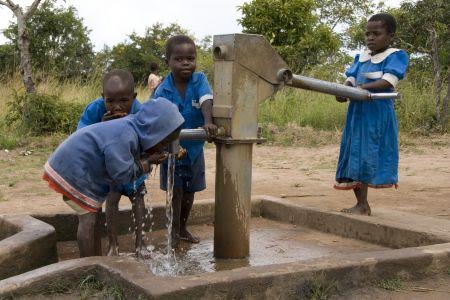Eight Schools in Lagos Obtain Potable Water, Toilet Facilities
Teachers and pupils of eight public primary schools in Shomolu Local Government Area, and Bariga Local Council Development Area of Lagos State could not hold back their joy recently, as their dream of access to safe water and basic sanitation in the learning environment came true.
The feat which was made possible by Stop Diarrhoea Initiative (SDI), organised by Save the Children, with support from Reckitt Benckiser and Lagos State government aimed at addressing high prevalence of diarrhoea which accounts for over 16% of child deaths in Nigeria and an estimated 150,000 deaths mainly amongst children under five annually’ [read more]
Niger Delta Biodiversity Project Rescues Endangered Species
Following indiscriminate exploitation and destruction of natural resources, an intervention scheme funded by Global Environment Facility (GEF) is rekindling hope of preserving endangered species and plants within local communities in the Niger Delta.
The communities are part of a pilot project under the Niger Delta Biodiversity Conservation Project (NDBP), which began three years ago, budgeted to cost about $5.7 million and implemented by the Federal Ministry of Environment in partnership with United Nations Development Programme (UNDP) through a project management unit in Port Harcourt, Rivers State.
About four states – Rivers, Akwa Ibom, Bayelsa, and Delta were mapped out for the UNDP- GEF five- year project. The states are characterized by high biological diversity, abundant natural resources, and extreme poverty. The long-term is to garner stakeholders’ support for the establishment of a Niger Delta Biodiversity Trust with local communities, oil and gas companies and government as core beneficiaries’ [read more]
2,500 Children Affected by Lead Poisoning in Niger
The Federal Ministry of Environment, says it has facilitated the treatment of lead poisoning of more than 2,500 children affected in Shikira community of Rafi Local Government Area of Niger.
Mrs. Aanu Basil, the Deputy Director, Marine Pollution, Contamination Clean-Up and Remediation in the ministry said that the clean-up programme was an intervention from government to prevent the lead poisoning outbreak in the community.
Mrs. Basil made this known in Abuja in an interview with the News Agency of Nigeria (NAN) on Saturday 11th of February 2017. She observed that lead poisoning was as a result of unlawful artisanal gold mining in Angwa Megero, Angwa Kawo and Shikira communities of the state.
She also noted that the federal ministry of environment collaborated with the federal ministry of mines and steel and Ministry of Health to ensure effective implementation of the project’ [read more]
USAID Identifies Inappropriate Use of Fund as Problem Affecting Nigeria’s Development
The United States Agency for International Development, USAID, has identified inappropriate use of funds as one of the problems affecting national development in Nigeria.
The USAID Senior Planning and Program Adviser (Health Population and Nutrition Office), Mrs Celestine Carr, said the USAID was committed to supporting the efforts of the Nigerian government in preventing women and children from falling victims of preventable diseases, by injecting more funds to increase universal health coverage to all citizens.
Mrs. Carr advised federal and states governments to ensure judicious use of available health financing options in the face of dwindling global funding for the health sector in Nigeria.
She added that, “One of the challenges that the government has had both in national and state levels is inappropriate use of existing funds’ [read more]
Ireland Becomes First Country to Stop Funding Fossil Fuels
Ireland has made a history by signing itself as the first country in the world to completely stop investing its money in fossil fuels.
The fossil fuel divestment bill gathered the majority vote, 90 to 53, of the Irish parliament, in favour of putting breaks on coal, oil and gas investments from the eight-billion-pound Ireland Strategic Investment Fund. The piece of legislation is now set to move forward to the Committee stage in the Irish Parliament.
The Irish political system is now finally acknowledging what the overwhelming majority of people already know: That to have a fighting chance to combat catastrophic climate change we must phase out fossil fuels and stop the growth of the industry that is driving this crisis’ [read more]

